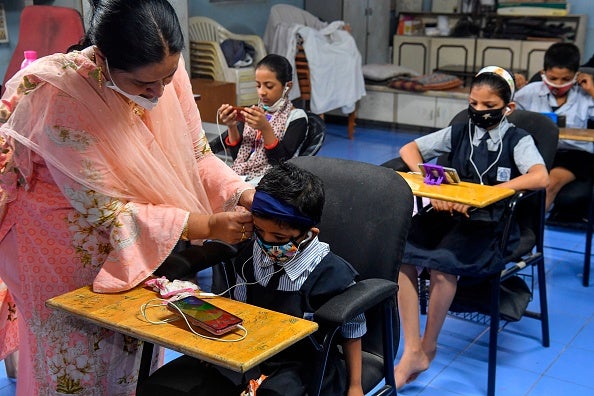Teenager in India kills himself after shattered mobile phone screen means he can’t attend online classes
Pupils are slowly returning to classrooms across India, but experts say lockdown will leave 'permanent scars' on a generation

Your support helps us to tell the story
From reproductive rights to climate change to Big Tech, The Independent is on the ground when the story is developing. Whether it's investigating the financials of Elon Musk's pro-Trump PAC or producing our latest documentary, 'The A Word', which shines a light on the American women fighting for reproductive rights, we know how important it is to parse out the facts from the messaging.
At such a critical moment in US history, we need reporters on the ground. Your donation allows us to keep sending journalists to speak to both sides of the story.
The Independent is trusted by Americans across the entire political spectrum. And unlike many other quality news outlets, we choose not to lock Americans out of our reporting and analysis with paywalls. We believe quality journalism should be available to everyone, paid for by those who can afford it.
Your support makes all the difference.A teenage boy in India has killed himself after smashing the screen on his mobile phone, in a case that highlights the huge challenges faced by families trying to access education during the coronavirus pandemic.
Rohit Varak, a 16-year-old living in the western state of Goa, was using the only smartphone shared by his family of six to attend online classes when he dropped it earlier this month, breaking the screen. He was found dead four days later.
“It would have cost about Rs 3,000 (£31) to repair the phone,” Rohit’s 18-year-old sister Neha Varak told The Independent. “My father did not have that kind of money.”
Rohit’s story is far from an isolated incident in India, where the media have reported several high-profile suicides related to the country’s gaping digital divide since it went into strict lockdown in late March. Many schools still have not returned to the classroom, with the matter being decided on a state-by-state basis.
The Varak family survived on the single income brought in by Rohit’s father, who works as a driver of a private bus – public transport services have been among the hardest hit industries during lockdown.
Rohit’s parents were too distraught to speak to the media, but his uncle Bhago Varak explained that the family income has been very low ever since the pandemic hit.
“With the gradual easing of the lockdown, we now earn about Rs 500 (£5.20) [a day], but that is not enough to meet the daily expenses of the family,” Mr Varak said.
The loss of the smartphone – police have taken it in as evidence – is now also hurting the education of the other members of the family.
Rohit’s 12-year-old younger brother, Gyanu, has been unable to attend any of his online year 7 classes since the phone broke on 11 October.
And the broader financial constraints on the family mean Ms Varak may be forced to drop out of nursing college, where she has been admitted on a three-year course where the fees are Rs 500,000 (£5,200). “I want to be a professional nurse, but how will I afford it without any scholarship or external support?”
In an interview with The Independent, a leading academic on school systems in India said the Covid-19 crisis “looks like it is going to leave many permanent scars” on the country’s children.
“The pandemic has severely reinforced existing inequities in a schooling system that was highly unequal and brittle to start with,” said Professor Ankur Sarin, who teaches Public System Groups at the Indian Institute of Management in Ahmedabad (IIM-A).
Previously unpublished research conducted by IIM-A and Unicef showed that 98 per cent of households in the city of Ahmedabad did not have access to a laptop or Wi-Fi at home.
The survey, conducted between July and September, found 20 per cent of households don’t have a smartphone – and among those who did, almost a third lacked access to a 4G connection.
The study heard from parents who said class timings of their differently-aged children clashed, meaning children often had to miss online schooling as a result. Other families described how their children had to work at odd hours, often at night, once parents returned home from work with the only smartphone available.
The survey found that overall, almost 30 per cent of children in the sample had not received any formal classes or learning activities since the lockdown began in India on 25 March.
Suicides reflected one extreme of a spectrum of problems, Professor Sarin said. “These include children dropping out of school altogether to [parents’] preferred options no longer being affordable; nutritional loss as children lose access to midday meals and severe mental stress on parents and children.
“During our calls, there were several instances where parents inquired about the costs and disadvantages of dropping out, and even discussed how they would only continue to educate only their ‘smartest’ child.”
Most teachers who participated in the survey also expressed the need for mental health and emotional wellbeing to be a priority, but said they lacked any proper training to help their students on this front. Many said it would be difficult to prioritise mental health support given the pressure to complete the year's syllabus, Professor Sarin added.
One teacher said that by staying at home and seeing all the troubles in their household as a result of the coronavirus crisis – which has led to soaring unemployment – children “are being exposed to events that will compel them to mature faster”.
If you are experiencing feelings of distress and isolation, or are struggling to cope, The Samaritans offers support; you can speak to someone for free over the phone, in confidence, on 116 123 (UK and ROI), email jo@samaritans.org, or visit the Samaritans website to find details of your nearest branch.
For UK services local to you, the national mental health database – Hub of Hope – allows you to enter your postcode to search for organisations and charities who offer mental health advice and support in your area.




Join our commenting forum
Join thought-provoking conversations, follow other Independent readers and see their replies
Comments